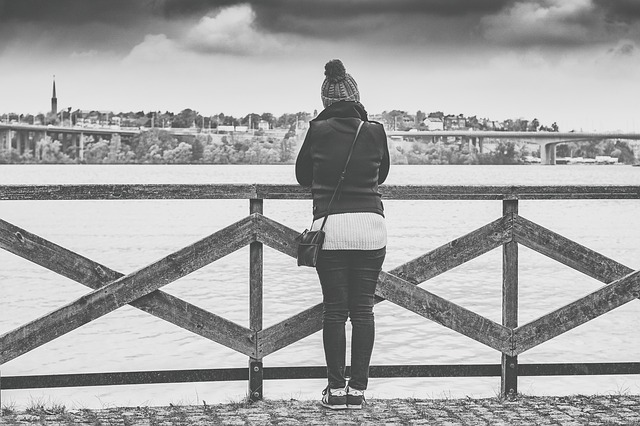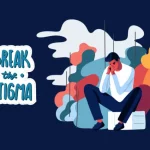
Photo by M.T ElGassier from Unsplash
Injuring yourself in a fall is a shock. As humans, we walk easily and confidently. When an accident happens and we are hurt badly, it affects our health, sense of freedom, and also our confidence.
All of these can create feelings of anxiety that can be crippling, too. As a matter of fact, Post Traumatic Stress Disorder (PTSD) can be caused by physical injury or accident.
You’re more than twice as likely to develop PTSD after experiencing a serious accident or injury than if you were to witness someone being injured.
After your body heals, your anxiety may continue on for weeks, months, or years. It’s important to recognize the symptoms of anxiety, and these tips will help you get past the worry, stress, and physical symptoms that can appear.
1. Understand what anxiety is

In our daily life, we worry. Did I lock the door? Is my boss upset?
What is that noise coming from the car engine?
We feel stressed, our heart rate goes up – these are normal reactions. We resolve the situation and move on.
But, when the worry and bad feelings come from nowhere – or continue to pop up after a stressful event is long over – this tells us that anxiety has taken root. Anxiety can be diagnosed with some of the following symptoms:
- Fatigue
- Racing heart and dizziness
- Insomnia
- Aches and pains
- Worrying that just won’t stop
- Obsessive thinking and compulsive behavior
As you can see, anxiety affects us both mentally and physically. The good news is that it can be diagnosed, and treated – especially when it’s caught early.
2. Get diagnosed
Visiting your doctor is the first step in getting help. Your physician will ask you questions about how you’ve been feeling and your physical symptoms. They will talk to you about how long you’ve been experiencing these symptoms, and how they are affecting your daily activities.
With an accurate diagnosis, you will be able to receive treatment for your anxiety. Your doctor may recommend any of these options:
- Medication
When prescribed by a professional, the proper use of antidepressants or anti-anxiety drugs can help patients reduce their uncontrolled anxiety. The goal here is to assist in healing physical injuries while addressing the mental symptoms that can manifest after an accident.
- Counseling
Your doctor may recommend working with a medical health professional to help you identify and control your fears and anxieties.
Sometimes, we need this assistance to help us be more objective and to learn effective coping skills to get past our anxiety. A good counselor can make this process faster and more efficient.
3. Make some positive changes

Once you’ve begun to manage your symptoms with the help of your doctor, there are some lifestyle changes that will help reduce your anxiety.
- Physical activity
When you’re ready, gentle exercise is a good way to help stress levels. The physical health benefits are more obvious – improved cardiovascular health, feeling stronger, lowered blood pressure – but the mental benefits are great too.
Regular exercise, even if it’s just a walk around the block or a visit to the fitness center, is a proven way to help lift your mood and feel better in general.
- Watch caffeine and alcohol consumption
When we are feeling overwhelmed, it’s easy to reach for that extra cup of coffee. Caffeine can make you feel focused and productive. It also raises your heart rate and blood pressure, making your anxiety levels climb with those extra beverages. Slowly tapering your caffeine consumption can have a perceptible impact on your feelings of anxiety.
- Get enough sleep
Lack of sleep not only makes you feel bad, but it can also actually make you feel even more anxious. Getting an adequate amount of sleep every night is an easy way to help manage the symptoms of anxiety. And, since you’re cutting back on caffeine – it should be easier, right?
- Meditation
Focused meditation has been proven to help with stress and anxiety. There’s no need to join a class – there is an abundance of guides, videos, and other sources available both online and offline. Try incorporating a few minutes of the practice daily. You might find that it helps you remain calmer as you run up against those anxious feelings in your everyday routine.
4. Consult other professionals
Worrying about medical bills and other issues can add another layer to the anxiety you’re experiencing. Feeling out of control is a common symptom of anxiety.
When your fall and injuries are caused by another person’s negligence, for example, it adds to feeling like your life is out of control.
By not putting off consultations with your insurance company or your attorney, you will feel more empowered.
Dealing with the financial and life issues beyond your slip and fall accident can be overwhelming, and letting a trained professional take over the details is a sensible and smart way to help reduce your daily stress levels.
5. Accept support and get back out there
Don’t be afraid to share your feelings with your family and friends. Anxiety is nothing to be ashamed of. Identifying your anxious moments will help you use your coping skills, and not feel so isolated during an anxiety attack.
If you’ve always enjoyed the social activity, don’t let the thought of an anxious episode keep you at home.
Once you’ve added the positive lifestyle changes above, it’s essential that you learn to use them in real-life situations. As corny as it is, the old saying “Practice makes perfect” applies here.
Support groups, which can be found online or through your doctor, can also be tremendously helpful. These provide an opportunity to join others who are experiencing some of the same symptoms and issues that occurred as a result of your fall and share your feelings in a controlled environment.
Conclusion
Dealing with anxiety after an accident is perfectly normal. The shock of a sudden slip and fall injury can cause damages that linger long after your body heals. Focused meditation has been proven to help with stress and anxiety.
Fortunately, anxiety is better understood today and millions of people have been able to successfully deal with their anxiety – you will, too.
About The Author:
 Scott Distasio is the founder of the Distasio Law Firm in Tampa. His career focus is on all types of personal injury cases. His work represents his belief that all firms should provide outstanding service to their clients. Follow @scottdistasio on Twitter to see what legal wisdom he shares next
Scott Distasio is the founder of the Distasio Law Firm in Tampa. His career focus is on all types of personal injury cases. His work represents his belief that all firms should provide outstanding service to their clients. Follow @scottdistasio on Twitter to see what legal wisdom he shares next




